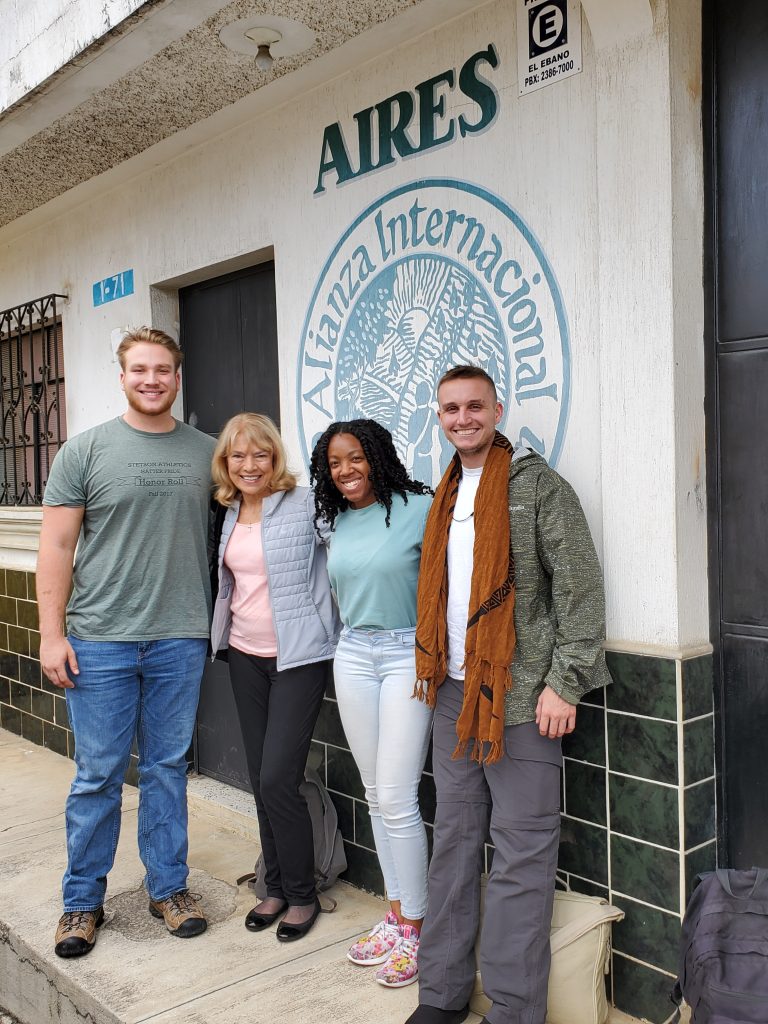By Camila Morales Hernandez, ’20

Over the summer, the Stetson students, Sydney Arrington, a Public Health major/Spanish minor, Peter Gruebel, also a Public Health major; and Matinicus C’Senger, double major in Economics and Philosophy and an Environmental Sustainability Fellow at Stetson, did a summer internship with AIR (Alliance for International Reforestation, Inc) Guatemala. During the experience, the students were able to work closely with local farmers to learn the practice of Regenerative Farming. The students also spoke Spanish during the entire time of the experience.
WHAT IS AIR GUATEMALA?
AIR is a non-profit organization improving human and environmental health in Guatemala. With operations in Atlanta, Georgia and central Guatemala, AIR has trained over 4,000 farm families and planted almost 6 million native trees in Guatemala. For over 25 years, AIR has implemented a community-based, five-year approach with great results and success. AIR is a winner of the 2017 Equator Prize from the UN Environment Programme because of this successful model. All salaried employees are local professionals, so ninety-two percent of funds and donations go straight to the field to implement projects and programs: Rural school programs; tree nurseries; farmer training; and efficient, custom stoves. AIR was founded in 1992 at Stetson University after Dr. Anne Hallum, Stetson University political professor, visited Guatemala for the first time and observed first hand the rural hunger and malnutrition, the barren mountainsides and mudslides, and the strength of the Maya people.
GOALS, PROCESS AND ACADEMIC PURSUITS:
Each year, one to three Stetson students are selected to participate in the AIR Guatemala internship program. All of their program expenses are covered by a generous endowment by Drs. David and Leighan Rinker. The main goal of the internship is for the student to provide tangible benefits to the local residents. Likewise, the experience is designed to align with the academic pursuits of the students.
Learning goals for the student interns include:
- Discover the value and method for farming with trees (“Regenerative farming” aka “agroforestry”) for better anthropological and environmental well-being: The students planted trees where they brought the most benefit for the communities: Acatenango, Xibalbay, Paquixic, and Montellano.
- Learn the effect of working with residents instead of for them. Residents requested help constructing efficient stoves from AIR Guatemala. Students constructed 3 stoves for two days, resulting in transformational lessons since they saw the living styles of the Mayan families, the hazards of breathing smoke all day, how close the families are and how fully their connection was to surrounding nature.
- Shadow the president of AIR Guatemala, Dr. Hallum. During the second week, a large group of volunteers arrived from Florida and Georgia, and all three Stetson students were enormously effective in welcoming these volunteers and showing them what they had learned the first week. Dr. Hallum also had all three students accompany her on important meetings with the AIR staff. The interns were especially helpful in an unforeseen way: Dr. Hallum was prefacing a network technology of registering via GPS the exact location where each tree was planted, and then “selling” the planted trees to a company in Hong Kong for purpose of combating climate change. The staff—and Dr. Hallum—had to learn how to use this technology and naturally, the Stetson students were very comfortable with this fascinating technology and taught the staff the functions of it.
- Learning about the Mayan and Ladino cultures in Guatemala. An overarching goal is that students learned about the regional cultures while planting trees and building stoves in rural communities. For instance, one day, the women of the communities brought lunch in the field where the students were planting trees —they carried tortillas and hot soup in containers on their heads. The team also participated in two school programs with Mayan dances which the class students had prepared especially for AIR visitors.
FOOTPRINT LEFT IN GUATEMALA
The three students supported the construction of three fuel-efficient stoves which involved mixing cement, soaking and laying bricks—each stove required six-hours of work. The stoves have a chimney to ventilate smoke and prevent lung diseases; they also help to conserve trees.
The volunteers this summer—including the three students—planted approximately 2,000 trees. The trees were strategically located to prevent soil erosion and improve crops with nitrogen-fixing roots; prevent mudslides, and to protect water sources. As previously mentioned, the students taught AIR staff members and Dr. Hallum how to use the technology for photographing and syncing each tree. By the end of the two weeks, the team had registered and sold 886 trees to a company in Hong Kong.
The three students also participated in two rural school programs—helping to judge environmental contests and playing with children.
THE ADVENTURE DOES NOT STOP THERE!!
Apply to join this journey and work with Guatemalan communities in Summer 2020!!! Applications are due by February 1, 2020.
This article was written based on Dr. Anne Hallum’s annual Air Guatemala report.
